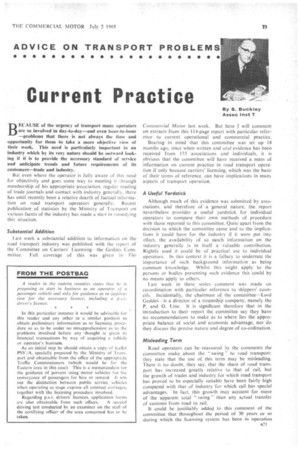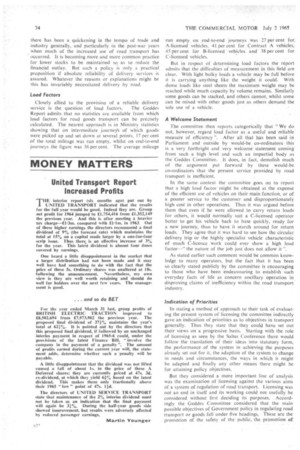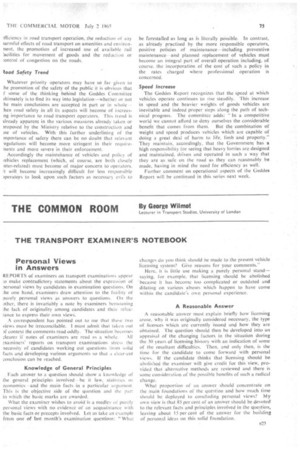ADVICE ON TRANSPORT PROBLEMS
Page 75

Page 76

Page 77

If you've noticed an error in this article please click here to report it so we can fix it.
Current Practice
BECAUSE of the urgency of transport man3 operators are so involved in day-to-day—and even hour-to-hour —problems that there is not always the time and opportunity for them to take a more objective view of their work. This need is particularly important in an industry which by its very nature should be outward looking if it is to provide the necessary standard of service and anticipate trends and future requirements of its customers—trade and industry.
But even where the operator is fully aware of this need for objectivity and goes some way to meeting it through membership of his appropriate association, regular reading of trade journals and contact with industry generally, there has until recently been a relative dearth of factual information on road transport operators generally. Recent publication of statistics by the Ministry of Transport on various facets of the industry has made a start in remedying this situation.
Substantial Addition
last week a substantial addition to information on the road transport industry was published with the report Of the Committee on Carriers' Licensing—the Geddes Committee. Full coverage of this was given in The
Commercial Motor last week. But here I will comment on extracts from this 114-page report with particular reference to current operational and commercial practice.
Bearing in mind that this committee was set up 18 months ago, since when written and oral evidence has been received from 173 associations and individuals, it is obvious that the committee will have received a mass of information on current practice in road transport opera, tion if only because carriers' licensing, which was the basis of their terms of reference, can have implications in man}, aspects of transport operation.
A Useful Yardstick
Although much of this evidence was submitted by associations, and therefore of a general nature, the report nevertheless provides a useful yardstick for individual operators to compare their own methods of procedure with those reported to this committee. Quite apart from the decision to which the committee came and to the implications it could have for the industry if it were put into effect, the availability of so much information on the industry generally is in itself a valuable contribution. Rightly used it could be of practical use to individual operators. In this context it is a fallacy to underrate the importance of such background information as being common knowledge. Whilst this might apply to the persons or bodies presenting such evidence this could by no means apply to others.
Last week in these series comment was made on co-ordination with particular reference to shippers' councils. Incidentally, the chairman of the committee—Lord Geddes—is a director of a steamship company, namely the P. and O. Line. It is significant therefore that in the introduction to their report. the committee say they have no recommendations to make as to where lies the appropriate balance of social and economic advantage, nor do they discuss the precise nature and degree of co-ordination.
Misleading Term
Road operators can bereassured by the comments the clommittee make about the " swing " to road transport: they state that the use of this term may be misleading. There is no doubt, they say, that the share of road transport has increased greatly relative to that of rail, but the growth of trades and industry for which road transport has proved to be especially suitable have been fairly high compared with that of industry for which rail has special advantages. In fact, this growth may account for more of the apparent total "swing than any actual transfer of customs from road to rail.
It could be justifiably added to this comment of the committee that throughout the period of 30 years or so during which the licensing system has been in operation B21 there. has been a.. quickening in the ternpo of trade and industry generally, and particularly in the post-war years when much of the increased use of road .transport has occurred. It is becoming more and more common practice for tower stocks to be maintained so. as to reduce the financial outlay. But such a policy is only a practical proposition if absolute reliability of delivery services is assured. Whatever the reasons or explanations might be this has invariably necessitated delivery by road.
Load Factors Closely allied to the provision of a reliable delivery service is the question of load factors. The .Geddes Report admits that no statistics are available from which load factors for road goods transport can be precisely calculated. The nearest approach is in Ministry statistics showing that On intermediate journey's of which goods were picked up and set down at several points, 17 per cent of the total mileage was run empty, whilst on end-to-end journeys the figure was 36 per cent. The average mileage run empty on end-to-end journeys Was :27 per cent forA-licensed vehicles, 41 per cent for Contract A Vehicles; 45 per cent for B-licensed vehicles and 38 per cent for C-licensed vehicles.
But in respect of determining load factors the report admits that the difficulties of measurement in this field are clear. With light bulky loads a vehicle may be full befOre . it is carrying anything like the weight it could. With dense loads like steel sheets the maximum weight may be reached while much capacity by volume remains. Similarly some goods can be stacked, and others cannot, whilst some can be mixed with other goods just as others demand the sole use of a vehicle.
A Welcome Statement
The committee then reports categorically that "We. do not, however, regard load factor as .a useful and reliable measure of efficiency ". After all that has been said in Parliament and outside by would-be co-ordinatorsthis is a very forthright and very welcome statement coming from such a high level and such an impartial body as the Geddes Committee. It does, in fact, demolish much of the argument put forward by these would-be co-ordinators that the present service provided by road transport is inefficient.
. In the same context the committee goes on to report that a high load factor might be obtained at the expense of the efficient use of vehicles on their main function, or of a poorer service to the customer and disproportionately high cost in other operations. Thus it was argued before them that even if he were allowed to carry return loads for others, it would normally suit a C-licensed operator better to get his vehicle back to base quickly, ready for a new journey, than to have it search around for return loads. They agree that It was hard to see how the circular delivery trip or the highly specialist vehicle characteristic of much C-licence work Could ever show a high load factor—" the nature of the job just does not allow it ".
As stated earlier such comment would be common knowledge to many operators, but the fact that it has been so clearly stated publicly by the committee is encouraging to those who have been endeavouring to establish such everyday facts of life as concern ancillary operation in disproving claims of inefficiency within the road transport industry.
Indication of Priorities In stating a method of approach to their task of evaluating the present system of licensing the committee indirectly gave an indication of priorities as to objectives in transport generally. Thus they state that they could have set out their views on a progressive basis. Starting with the role of licensing as seen by the Salter Conference there would follow the translation of their ideas into statutory form, the performance of the system in achieving the purposes already set out for it, the adaption of the system to change in needs and circumstances, the ways in which it might be adapted and finally any other means there might be for attaining policy objectives.
But they considered a more important line of analysis was the examination of licensing against the various aims of a system of regulation of road transport. Licensing was not an end in itself and its working could not usefully be considered without first deciding its -purposes. Accordingly the Geddes Committee considered that themain possible objectives of Government policy in regulating road transport or goods fell under five headings. These are the . promotion of the safety of the public, the promOtion of ;fficiency in road transport operation, the reduction of any larmful effects of road transport on amenities and en vironTient, the promotion of increased use of available rail acilities for movement of goods and the reduction or ;ontrot or congestion on the roads.
load Safety Trend Whatever priority operators may have so .far given to :he promotion of the safety of the -public it is obvious that f some of the thinking behind the Geddes Committee iltimately is to find its way into legislation—whether. or not :he main conclusions are accepted in part or in whole— hen road safety in all its aspects will become of increasng importance to road transport operators. This trend is dready apparent in the various measures already taken or Diroposed by the Ministry relative to the construction and _Ise of vehicles. With this further underlining of the rnportance of safety there can be no doubt that relevant .egulations will become more stringent in their requirerients and more severe in their enforcement.
Accordingly the nraintehance of vehicles and policy of .Tehicles replacement (which, of course, are both closely nter-retatecl) must become of major concern to operators. Ft will become increasingly difficult for less responsible verators to look apon.such factors as necessary evils to
be forestalled as long as is literally possible. In contrast, as already practised by the more responsible operators, positive policies of maintenance—including preventive maintenance and planned replacement of vehicles must become an integral part of overall operation including, of coiurse. the incorporation of the cost of such a policy in the rates charged where professional operation is concerned.
Speed increase • The Geddes Report recognizes that the speed at which vehicles operate continues to rise steadily. This increase in speed and the heavier weights of goods vehicles are inevitable and indeed proper steps along the path of technical progress. The committee adds: " In a competitive world we cannot afford to deny ourselves the considerable' benefit that comes from them. But the combination of weight and speed produces vehicles which are capable of dOing a great deal of harm to life, limb and property." They maintain, accordingly, that the Gcivernment has a high responsibility for seeing that heavy lorries are designed and maintained, driven and operated in such a way that they are as safe on the road as they can reasonably be made, having in mind the need for efficiency as well.
Further comment on operational aspects of the Geddes Report will be continued in this series next week.
























































































































